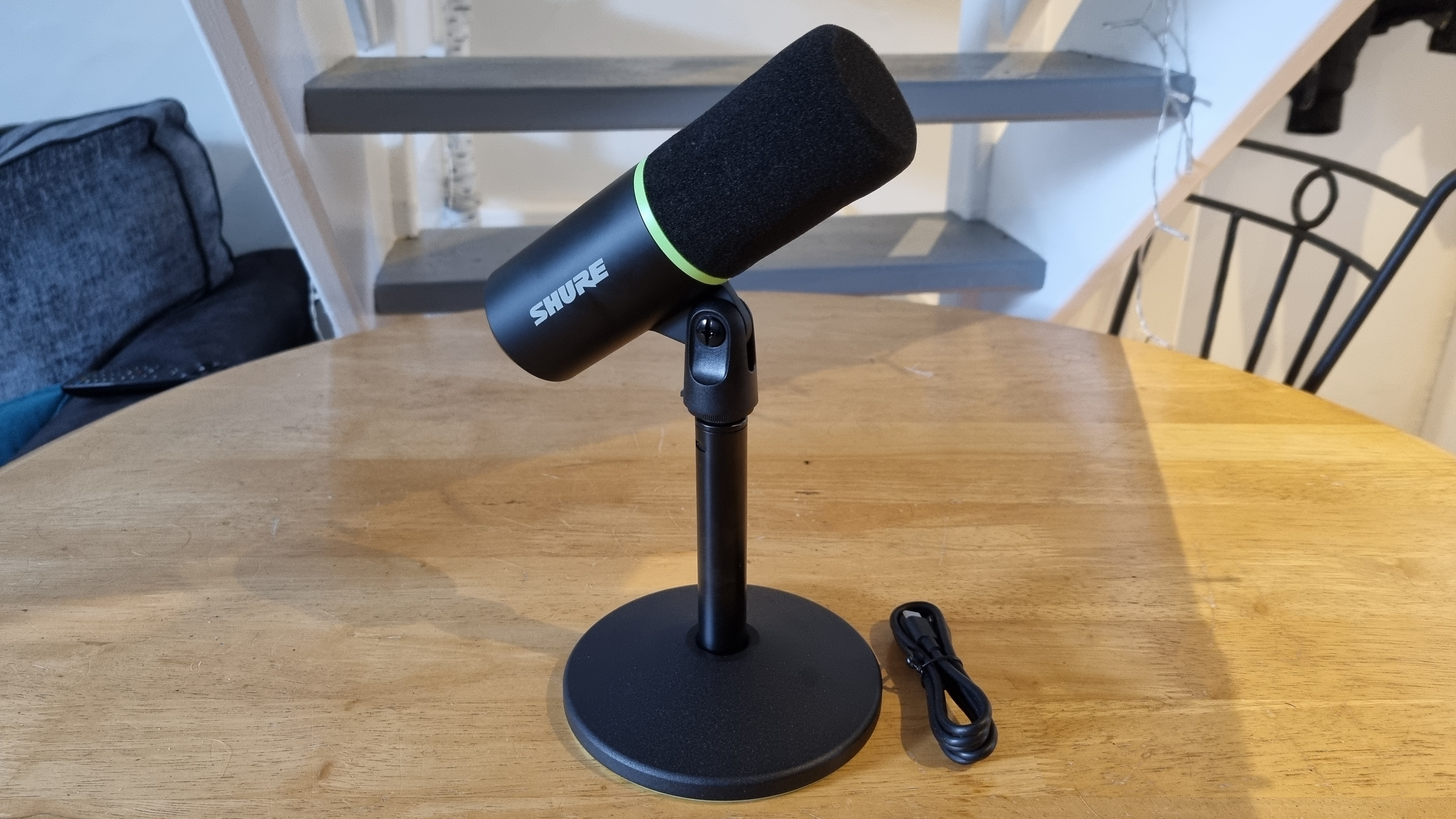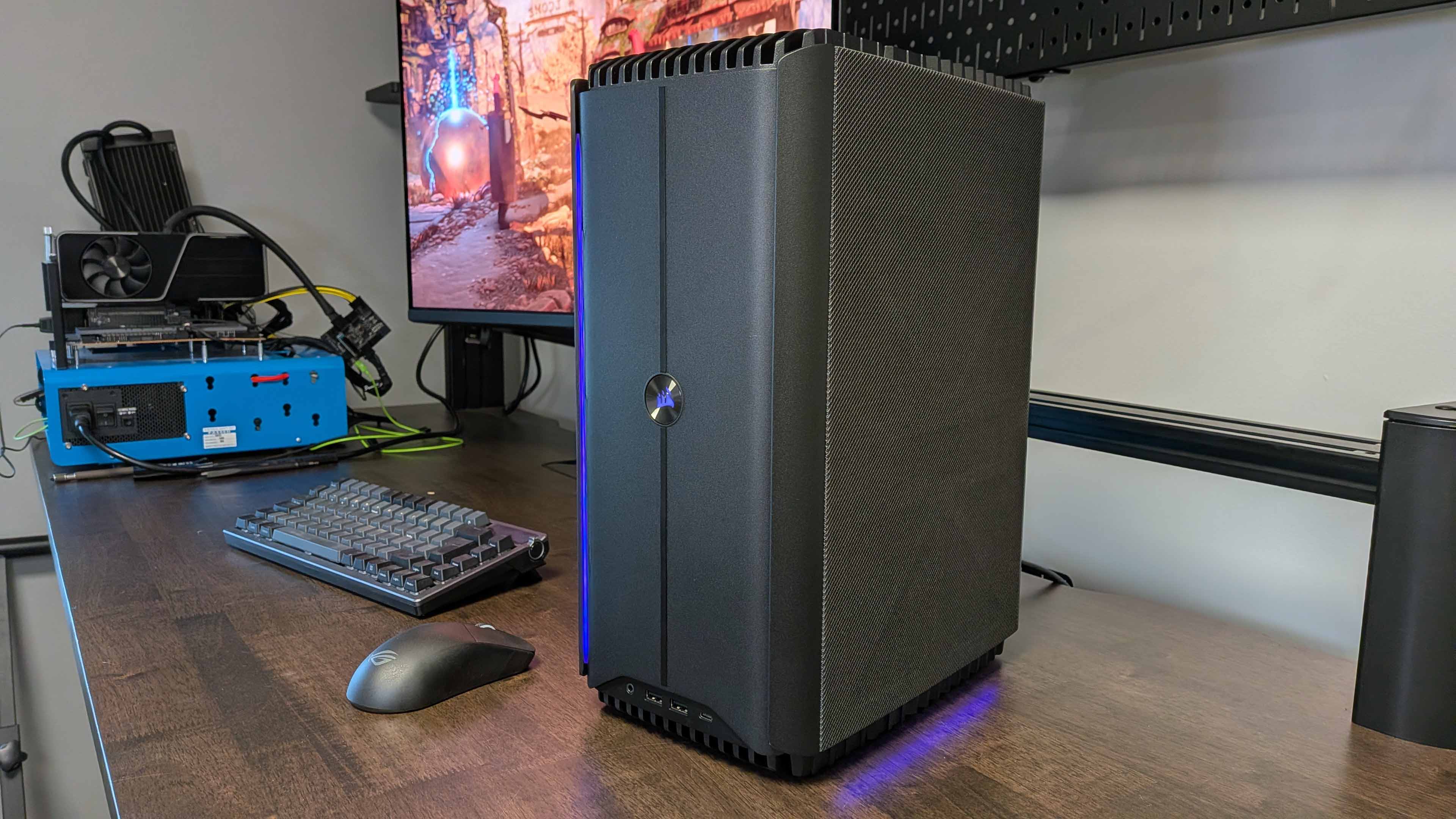Our Verdict
Smaller, cheaper, and more usable at a distance than the Shure MV7, the MV6 is a very good thing in a more compact package. The odd niggle aside, it makes for a formidable desktop gaming mic.
For
- Small form factor
- Excellent software
- Auto levelling works very well
- Sturdy desk stand
Against
- Included cable is too short
- Stand footprint is a little large
- Noise reduction is quite aggressive
PC Gamer's got your back
If there's a brand more associated with high-quality audio capture than Shure, I can't think of one. Should you find yourself in a recording studio, or watching a live band at a local venue, a quick look at the microphones will almost certainly reveal a Shure model or two somewhere in the lineup. We've been rating the Shure MV7 as our best microphone for gaming for some time now, and it's one that I've had several years of experience using for all sorts of vocal recording.
Now there's a new kid on the block. The Shure MV6 is the company's first attempt at a dedicated USB gaming microphone and, as if to prove it, they've festooned the outer chassis with a lime green ring underneath the foam and stuck a big green capacitive button on the top for quick muting. Yours for $149/£129, significantly cheaper than the $250 asking price for the MV7, which has sadly been discontinued in favour of the MV7+.
Other than the gamer-friendly green accents it's a pretty straightforward-looking device, and quite a bit smaller than the MV7 of old. That was a mic that required either a boom arm mount or a separately sold desk stand to hold it aloft. Here though, you get a proper desk stand as standard—and quite the chunky thing it is, too.
The footprint here is a little large for a desktop device, but at least that means it won't be going anywhere. It's properly weighty and overbuilt, so there's no wobbling to worry about on an even surface. It reminds me of a miniature live mic stand, the sort that Steven Tyler might attach scarves to and throw around if he was a mere foot tall. You can enjoy that mental image for free, if you like. I have.
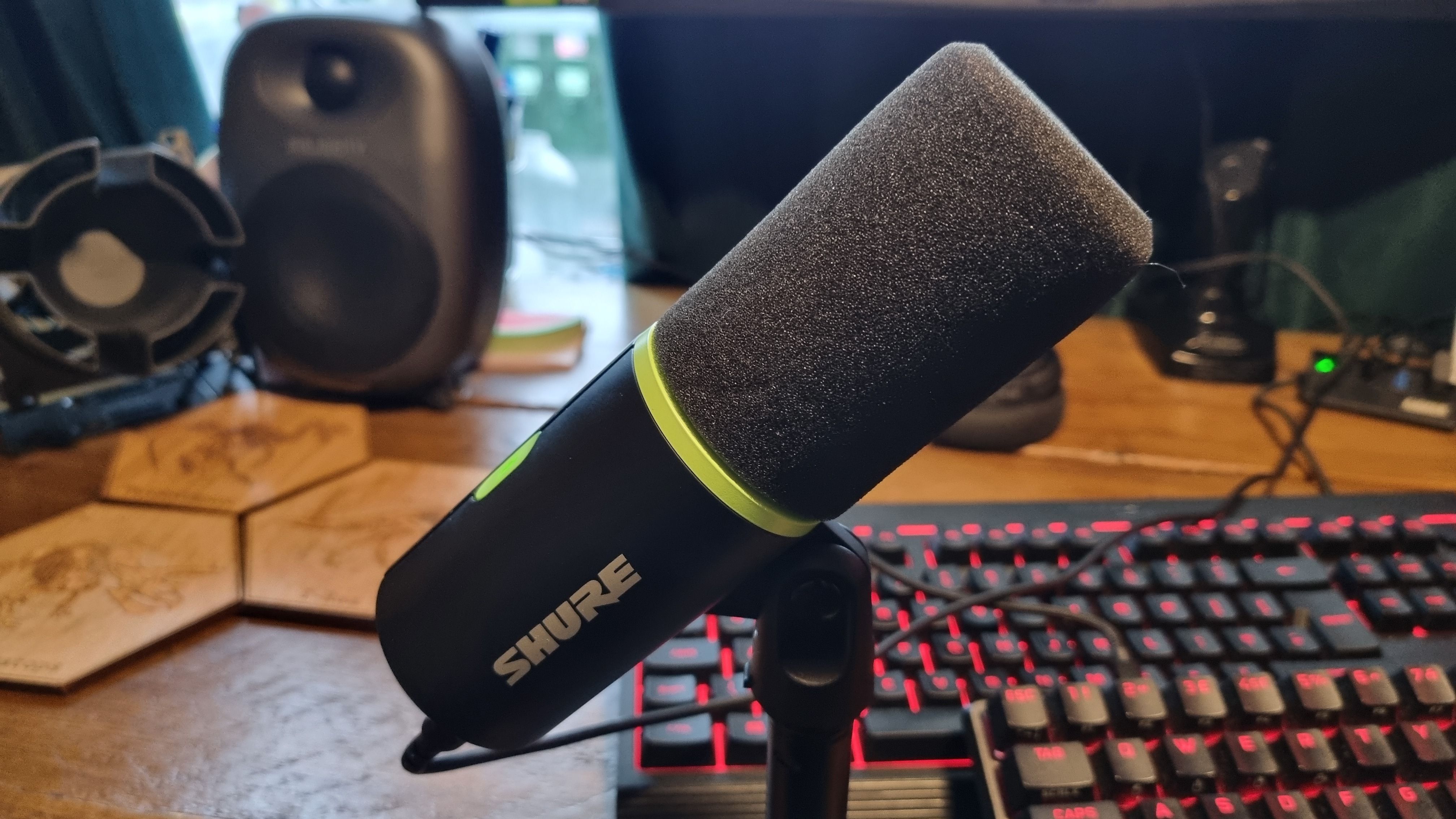
Type: Dynamic
Polar patterns: Unidirectional (cardioid)
Connectivity: USB Type-C
Recording Sample Rate: 16 or 24-bit, 44.1 or 48 kHz
Frequency response: 50 Hz to 15,000 Hz
Features: Capacitive top-mounted mute button, MOTIV software with auto levelling, noise reduction, plosive reduction
Price: $149/£129
Anyway, I digress. The real headline news here is Shure is claiming it's taken all of its microphone knowledge and shrunk it down into a USB gaming mic. This is a dynamic unit, which should give it more of a focused sound compared to traditional condenser microphones. The downside is that dynamic mics can be sensitive to poor mic technique, like shifting your speaking position or constantly adjusting your distance.
To address this, Shure makes use of an Auto Level Mode within its Motive Mix software suite. This intelligently adjusts the gain in real-time to give a consistent volume of sound, jumping in to lower the gain setting if you suddenly yell, and boosting it if you begin to drift away from the microphone or shift in your seat. While Auto Levelling is nothing new to those familiar with VST plugins, building a decent version of it into the software and activating it by default is a smart move when giving us unwashed gamers a dynamic mic to play with.
Upon plugging in the mic with an included USB Type-C cable and opening the software, you're greeted with a quick tutorial on how best to use it, with a suggestion to keep the capsule six to 12 inches from your mouth for best results. Good advice for most mics I'd say, to get the richest, most focussed sound—especially a dynamic one. Still, it's a little more difficult here to achieve than most, depending on your setup, as the cable is only 100 cm long.
Keep up to date with the most important stories and the best deals, as picked by the PC Gamer team.
Even if your PC is up on your desktop like mine, that's still not a lot of cable length for positioning options. A bit of a naughty niggle, that, although most of us will likely have a longer cable sitting in a desk drawer somewhere.
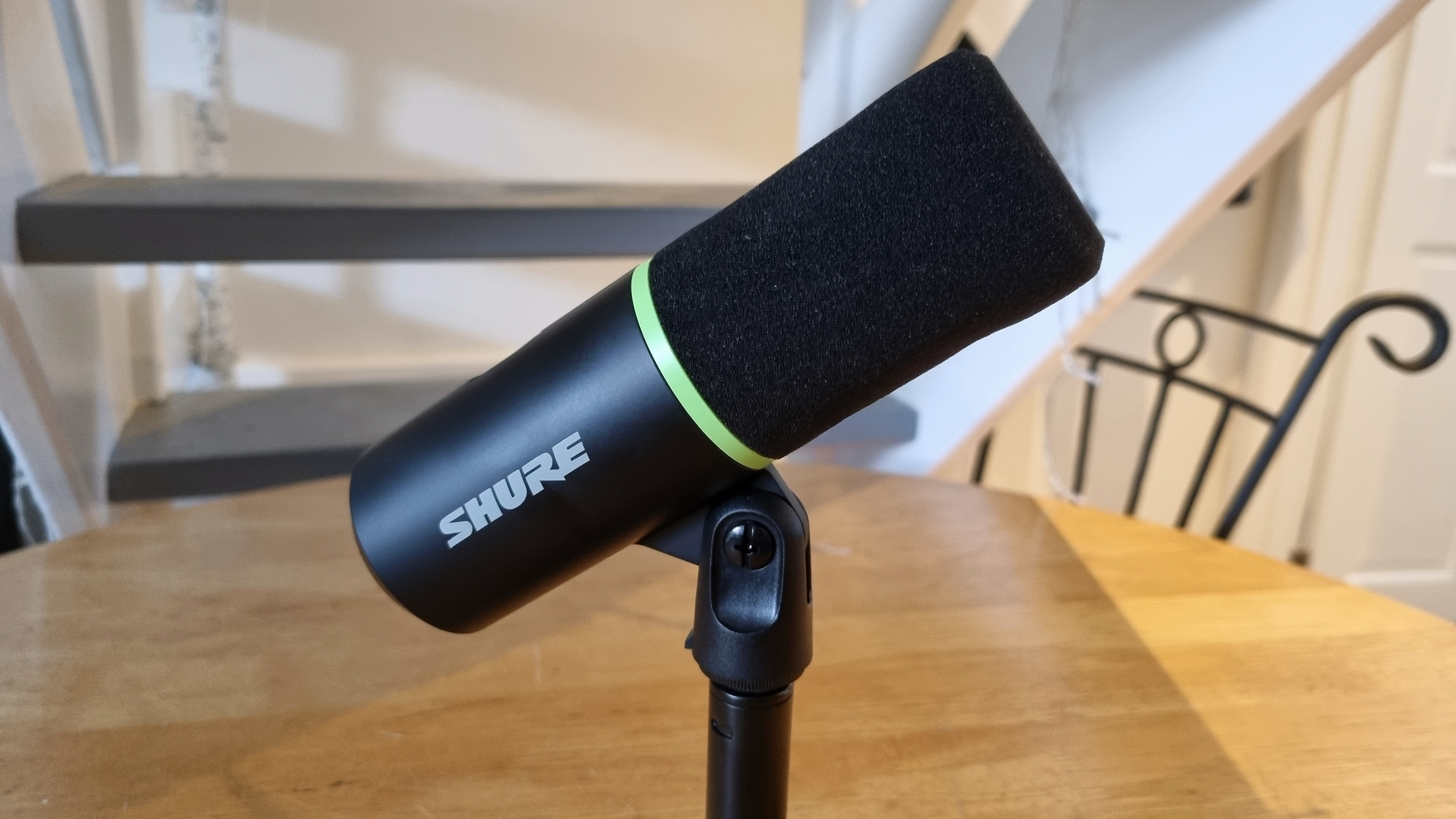
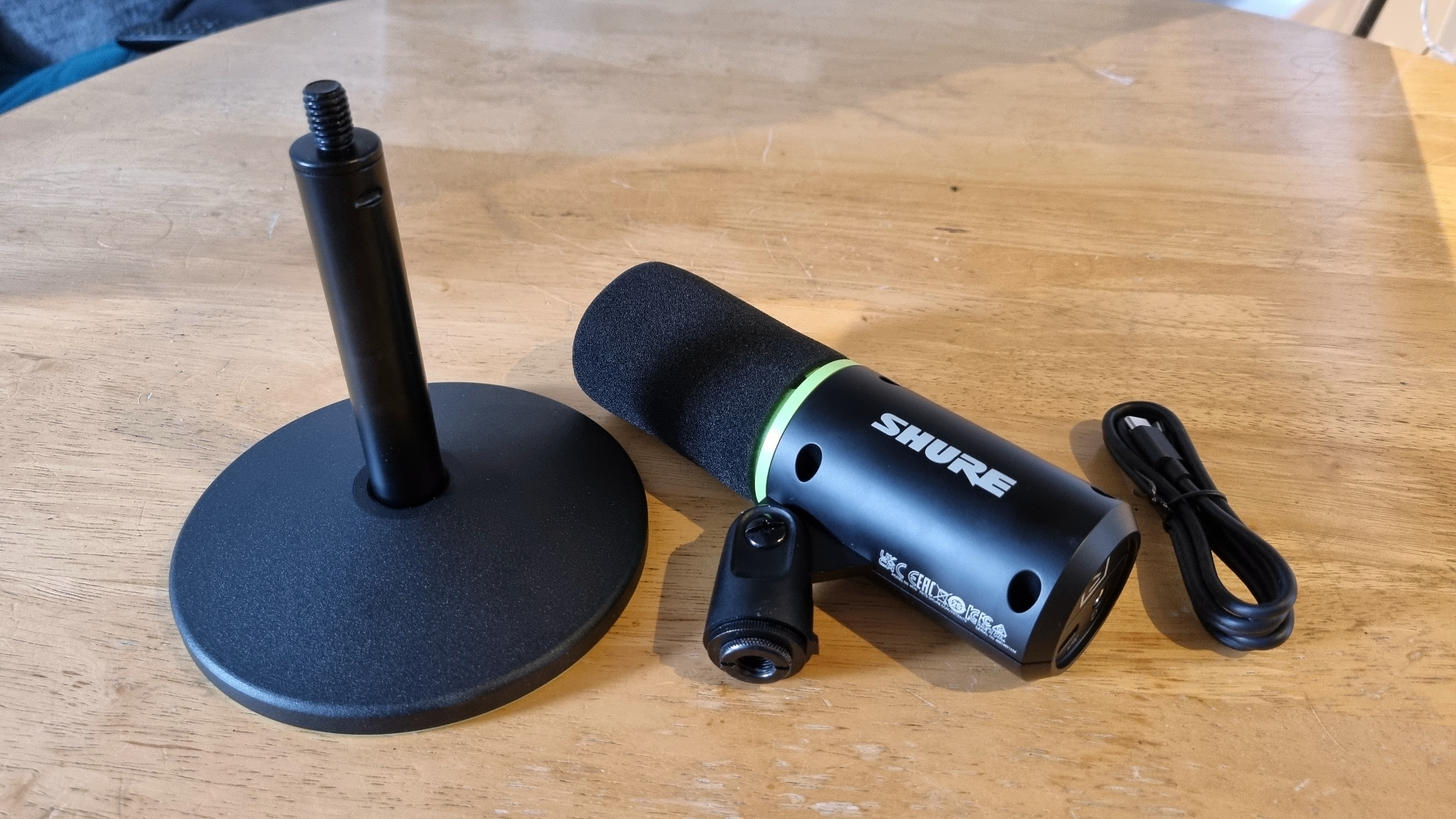
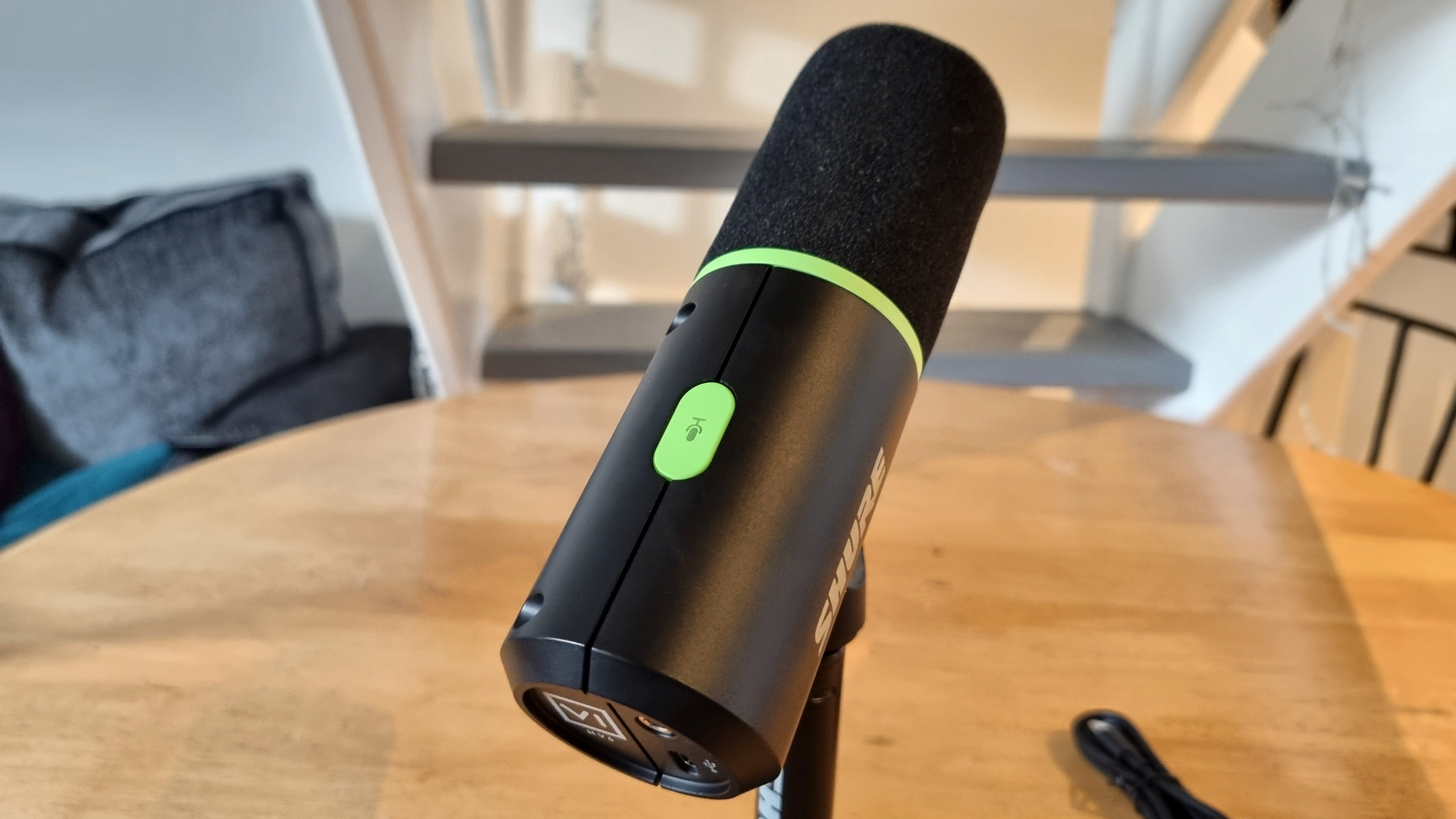
Thankfully, however, that Auto Level adjustment works brilliantly. While you'll always get the best vocal results with a mic like this close up, you can put it at a fair distance and still get a clear and distinctive sound. I tried to catch it out in a variety of ways, but it's pretty instantaneous to react—meaning you don't have to cosy up to the foam like a pro podcaster to get a good result out of it.
Speaking of close up, if you do choose to move the microphone nearer to your mouth to get a rich, warm result, you'll find it's much less prone to plosives than previous models. The MV7 is a glorious, wonderful microphone, but it does have a tendency to blow out "puh" and "buh" sounds when you put it near your lips. Here the MV6 employs another software trick, the charmingly-named Digital Popper Stopper. Again, it's enabled by default and does an excellent job of stopping percussive sounds from overpowering the rest of the audio.
There's also built-in noise reduction, something I'd suggest is a must-have for any desktop mic, even a dynamic one that's less prone to picking up background noise. It's very powerful, but I'd say that if anything it's a little too aggressive for my liking. Any noise reduction turned up to a sufficient level can introduce a slightly washy, warbly quality to certain vocal tones, and here it's occasionally perceptible.
There's no slider adjustment, just an on or off setting, which makes it a bit of a blunt instrument. That being said, it does cut down on ambient room noise considerably.
What does have a slider, however, is the tone adjustment. This is essentially an EQ setting that ranges from Dark, through to Natural, and then up to Bright. By default, it sits in the middle at Natural, which is where most will likely keep it, although as a fan of a "hot radio" kind of sound I like to edge it towards Dark to richen up the tone.
Speaking of tone, the quality of the vocal capture here is brilliant. While you'll still want something like the Shure MV7 up close if you're recording podcast audio, audiobook content or anything truly "professional sounding", the sound quality that the MV6 is capable of capturing from a desktop position is genuinely impressive. It'll definitely boost your audio quality at your next meeting compared to anything lesser, and as a gaming mic, I'd say it does a much better job of preserving your vocal tone while rejecting unwanted noises compared to most desktop units, thanks to that software help.
It's also a breeze to use. The Motiv Mix software is mercifully straightforward, with a built-in soundcheck feature to let you adjust gain levels and record a quick clip of yourself with the various settings to find the right sound for you. The mic itself is also pretty unobtrusive as an object on your desk, even with those lime green accents, so it should blend into the background as a good desktop mic should.
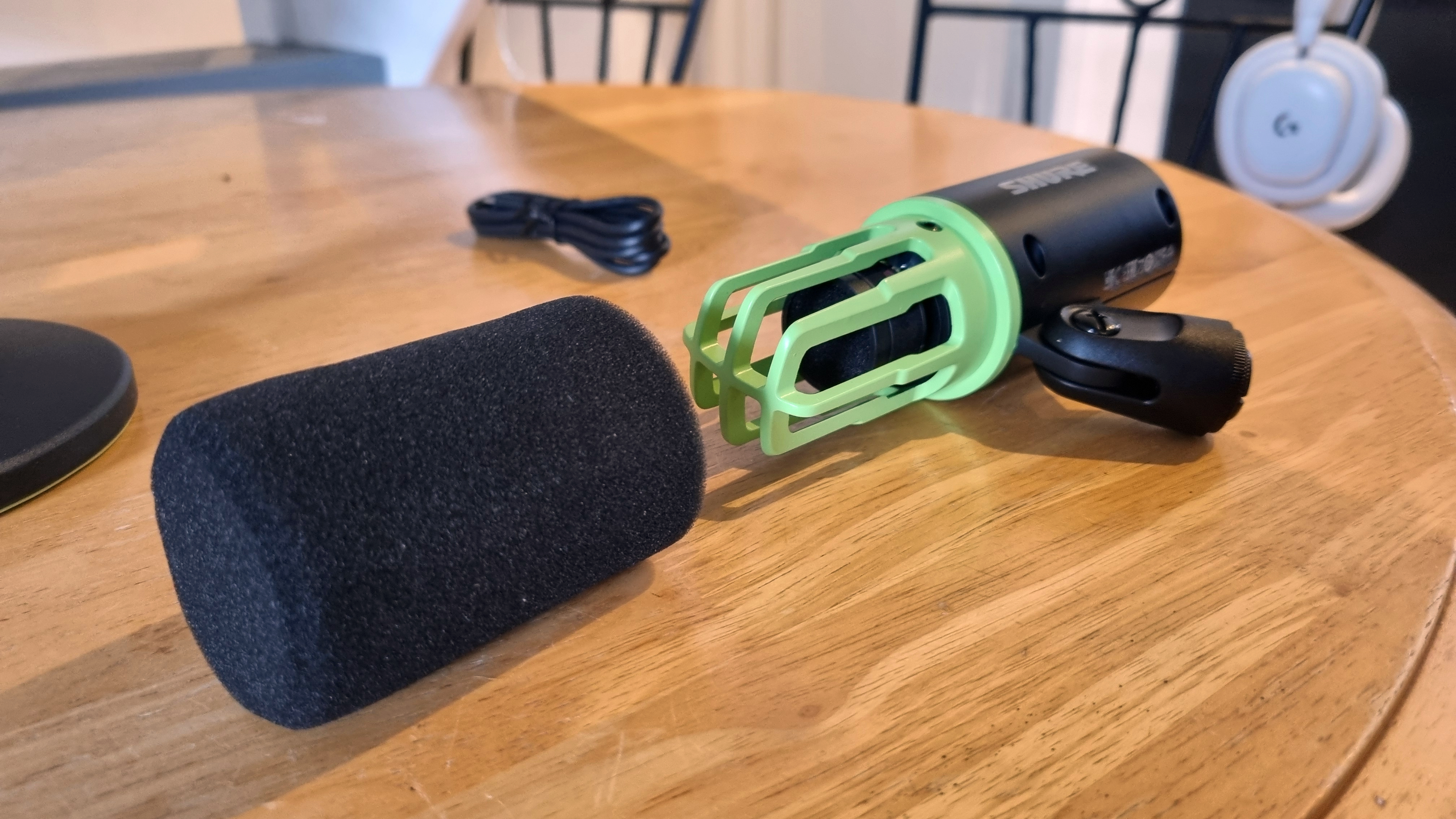
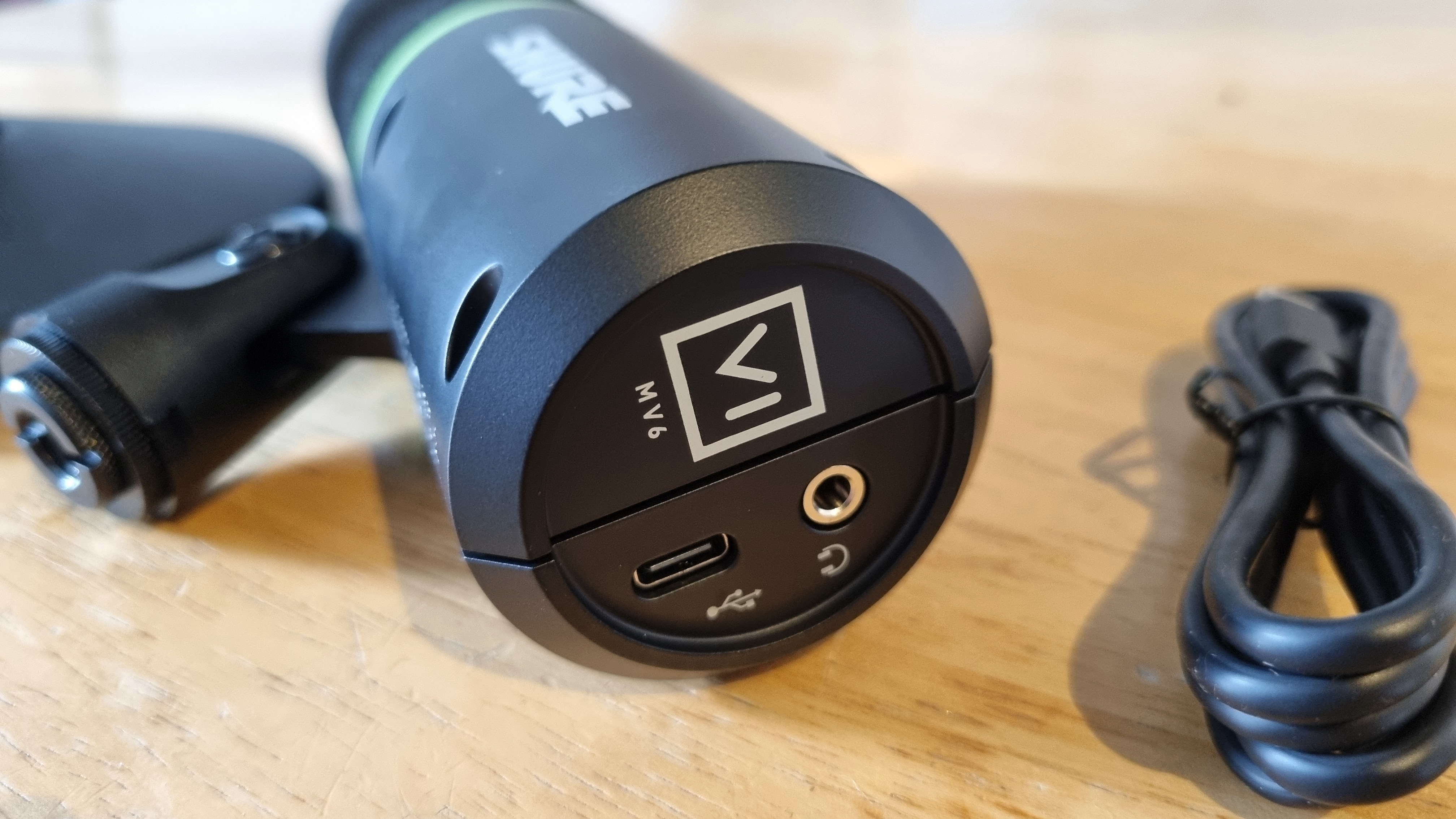
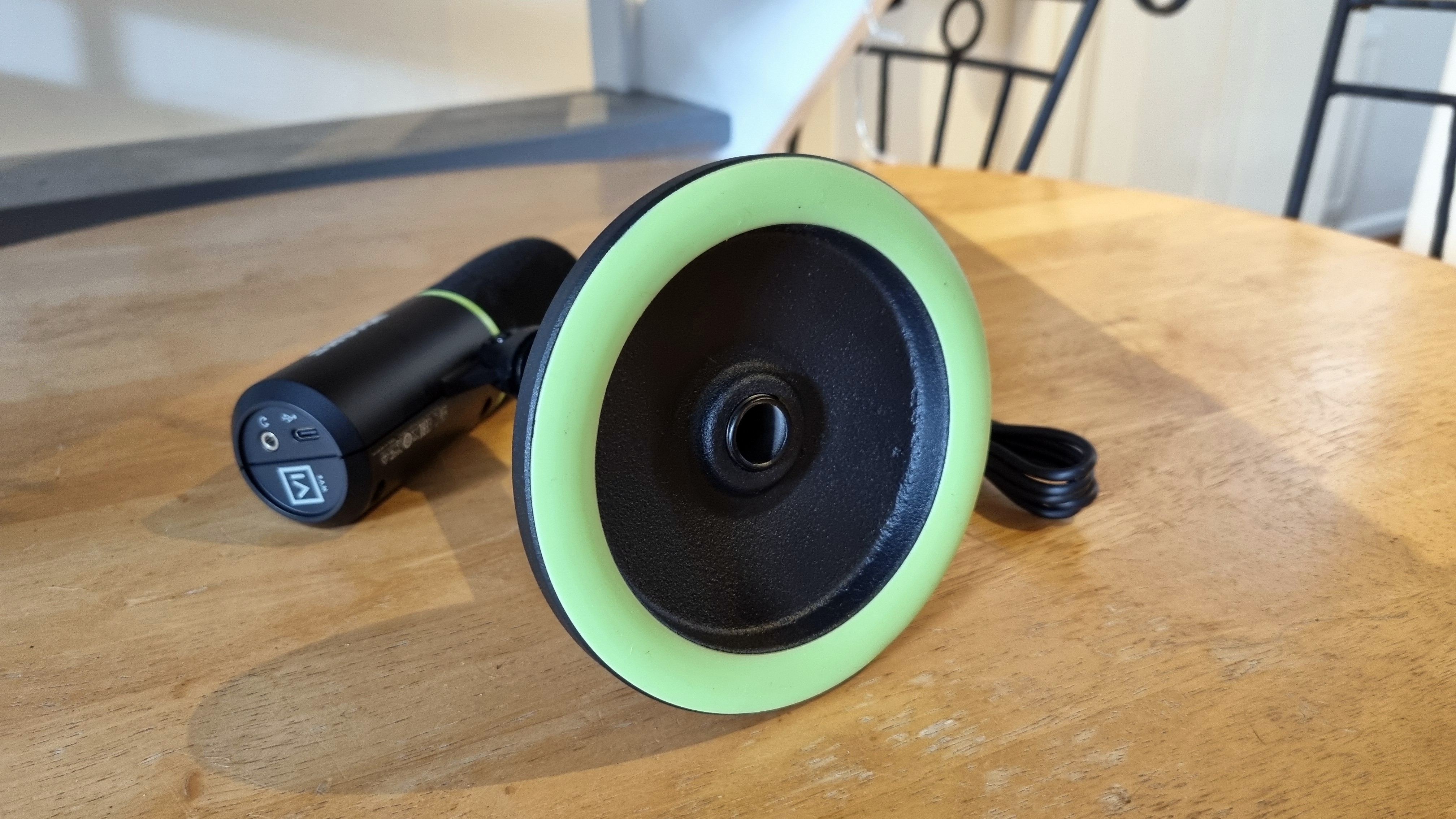
That sizable base at the bottom of the stand does give me pause, though. It's solid as a rock, and immune to being tipped over, but it does take up a fair bit of room if you want to get the mic as close as Shure suggests. Still, it doesn't wobble, and feels like it could be used as an impromptu weapon in a zombie-based emergency if needed, so plus points there.
✅ You don't have room for a boom arm: While a close-mic setup will always be the best solution for truly stunning vocals, the MV6 does an excellent job of replicating it at a reasonable distance.
✅ You don't mind paying for quality: While the MV6 is significantly cheaper than the MV7, it's still fairly pricey. Still, everything about it feels, and performs, like a premium bit of gear.
❌ You're on a tight budget: If all you need is decent sound quality, not fabulous, the MV6 is probably more mic than you really need. Cheaper, great-performing mics are available.
The real question is, should you buy an MV6 over an MV7 if you're in the market for a USB gaming microphone? Well, if you're leaving it on your desktop, thanks to that included stand, the ease of use, and the less obtrusive form factor, I'd say yes. It's also cheaper, and the top-mounted capacitive mute button is a handy extra feature.
If you're really looking for the top-end of audio quality though, and don't mind getting a large mic up in your face to do so, I'd still go for the MV7 as the better pick overall. It's a clumsier, chunkier beast, but it's also got a slightly warmer, crispier quality to it that I couldn't quite replicate with the MV6, even getting it up close with a boom arm. The MV7 also has an XLR connection, making it just as at home in a professional studio as it is with a standard PC.
To be honest, though, that's me getting all audio nerdy and looking for things that others will likely never notice, and picking out details that most gamers really shouldn't care about. It's still fairly pricey, I suppose, and both the Audio-Technica AT2020USB+ and the Razer Seiren Mini are fine options for substantially less cash, but both pale in comparison to the quality—in terms of build, vocal capture and features—of the MV6. The SteelSeries Alias is also worth a look if you want a mic that really minimises desktop space with good distance capture, but it's more expensive than the Shure, and the sound quality can't quite match it.
The bottom line is this: What Shure has made here is a mic that's built like a tank, can be used comfortably at a reasonable distance, and is significantly cheaper than the MV7—all while minimising most of the issues you get with traditional desktop microphones. And that's quite an impressive thing. Just give us a longer cable next time, ey Shure?
Smaller, cheaper, and more usable at a distance than the Shure MV7, the MV6 is a very good thing in a more compact package. The odd niggle aside, it makes for a formidable desktop gaming mic.

Andy built his first gaming PC at the tender age of 12, when IDE cables were a thing and high resolution wasn't—and he hasn't stopped since. Now working as a hardware writer for PC Gamer, Andy spends his time jumping around the world attending product launches and trade shows, all the while reviewing every bit of PC gaming hardware he can get his hands on. You name it, if it's interesting hardware he'll write words about it, with opinions and everything.
